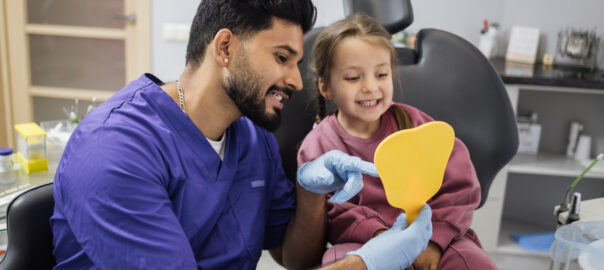What Ages Does a Pediatric Dentist Treat?

Children require a lot of care, and regular medical checkups are part of that. Seeing a pediatric dental specialist on a regular basis is also part of a good healthcare routine for a child. But what ages does a pediatric dentist treat? In this article, we will answer this question and discuss the importance of dental health care for children.
What Ages Does a Pediatric Dentist Treat?
Pediatric dentists treat children from the time the first baby tooth appears until around the age of 18. Children and teenagers benefit more from seeing a pediatric dentist than a general dentist. Pediatric dentists have the specialized knowledge and training needed to treat a growing mouth.
In addition, a good pediatric dentist knows how to make a child or teenager less anxious about their dental visits and how to educate them on oral hygiene in kid-friendly terms. A friendly environment that a pediatric dentist can provide will ensure a positive experience for the child and will lead to better oral health habits in the future.
Why Do You Need to Take Care of Baby Teeth?
You should not underestimate the importance of healthy baby teeth. The fact that baby teeth will eventually fall out does not mean that their health can be neglected. There are several reasons for taking care of baby teeth:
Tooth Decay or Tooth Loss Can Cause Malnutrition
Toothache in a baby tooth or tooth loss might prevent children from eating some foods that require a lot of chewing or biting. Such foods might include fruits, vegetables, nuts, meat, etc., and are crucial for the proper growth and development of a child.
Dental Health Problems Lead to Chronic Pain and Stress
Constant stress that a child experiences from tooth or gum ache can affect their mood and ability to concentrate, learn, and make friends.
Tooth Decay or Tooth Loss Can Cause Speech Impediments
A whole set of healthy baby teeth free of pain plays a crucial role in a child’s proper speech development.
Tooth Decay Can Lead to Gum Disease
If cavities are untreated for a long time, the decay and bacteria can spread to the other teeth in the mouth and to the gum tissue. Gum disease that starts in early childhood can cause problems with permanent teeth in the future. Additionally, gum disease can cause serious issues with the development of the jawbone and lead to bone density loss.
Baby Tooth Decay Has Negative Impact on General Health
Tooth decay means that bacteria and infections are constantly present in a child’s mouth. Oral infections can lead to problems with the heart, lungs, bones, and gastrointestinal system of the child. Studies show that tooth decay can even negatively impact a child’s cognitive function.
Precocious Baby Tooth Loss Can Lead to Orthodontic Issues
Untreated cavities in baby teeth lead to precocious tooth loss, which negatively impacts jawbone development and the growth of permanent teeth in the future. Precocious baby tooth loss can also cause overcrowdedness, improper bite, and other orthodontic issues that will require more expensive and time-consuming treatment.
Even if your child already has all their permanent teeth, oral health care remains just as important.
At What Age Should You Start Bringing Your Child to a Dentist?
Dentists recommend having the first dental visit with your child by 12 months of age or no later than six months from the appearance of the first tooth. During this visit, a pediatric dentist will examine your child’s teeth, gums, jaw, and bite. The exam is needed to ensure that growth and development progress as they should. Early visits can also help predict any potential orthodontic issues and plan the treatment accordingly.
Depending on your child’s oral health, your dentist might recommend a professional cleaning to remove plaque and tartar from the teeth to prevent bacterial growth in your kid’s mouth. However, this procedure is typically done when more teeth erupt, between 12 and 36 months of age.
In some cases, a child might not get their first teeth in their first year of life. Based on the data provided by AAPD (American Academy of Pediatric Dentistry), on average, children have their first dental visit at 2,5 years of age. If your child does not have teeth by the age of 12 months, you can postpone the visit until the time teeth do appear.
Make an Appointment Today
Samaritan Dental offers a dentist for the whole family, who will make both you and your child comfortable during the visit. If your child needs a routine exam or you suspect any dental issues, do not hesitate to make an appointment with one of our specialists today. We look forward to welcoming you and your children to our dental office!








 I have never had a better dental experience prior to my visit with Dr. Zabolian. It was pain free for the first time ever, the staff was friendly, accommodating to my schedule, there were no problems with my insurance claims... I am so happy I have found a dentist (after all these years) I feel so comfortable going to and also taking my family.
I have never had a better dental experience prior to my visit with Dr. Zabolian. It was pain free for the first time ever, the staff was friendly, accommodating to my schedule, there were no problems with my insurance claims... I am so happy I have found a dentist (after all these years) I feel so comfortable going to and also taking my family. 






